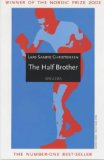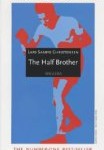 Translated from the Norwegian by Kenneth Steven
Translated from the Norwegian by Kenneth Steven
Winner of the 2002 Nordic Prize for Literature
Longlisted for the 2004 Independent Foreign Fiction Prize
Shortlisted for the 2005 IMPAC Award
Five words from the blurb: Norway, epic, family, brothers, life
The Half Brother is an epic, multi-generational story from Norway. The book begins shortly after the end of WWII and follows one family over several decades, concentrating on Barnum and his older brother, Fred, who was conceived during a rape. The brothers are very different in terms of both personality and stature; we see them grow up, learning to cope with their problems.
It is impossible not to develop an emotional attachment to all the characters in this book. They are distinct and realistic – a fantastic achievement given that this involves both sexes and four different generations. But it is the relationship between the two brothers that is the real attraction of this book. It is rare to find a fraternal relationship described with such accuracy and compassion.
The story was simple and easy to read, giving a wonderful glimpse into Norwegian life after the war. Many of the historical events were new to me and I was especially interested to see how the population reacted to the death of their king:
Some of the girls stood in a huddle by the fountain supporting each other. I envied them because they could cry. They were good. I wasn’t. I was bad. I had never seen the playground so quiet before. Nobody laughed. No one threw chestnuts at me. No one called my name. It was a fine morning. It should have been like that every day. It was just the way I wanted the world to be – slow, quiet, and with no jagged edges.
At over 750 pages this is a daunting book to start, but I quickly became hooked. Every page was necessary to the plot and it never dragged. It could be argued that too many tragic events affected this one family, but although the method of death was occasionally a bit unusual, I thought this book was realistic. Light humour was present at the darkest moments, so it never felt depressing.
Details of the family’s secrets were revealed slowly and, although most plot threads were tied up by the end, the reader never knows the whole truth. The atmosphere can be summarised by this quote:
And I remembered what Dad had once said, that it was necessary to sow doubt, because the whole truth was dull and made people lazy and forgetful, whereas doubt never loses its hold.
This is story telling at its best. Highly recommended.

.

One reply on “The Half Brother by Lars Saaybye Christensen”
[…] The Half Brother by Lars Saaybye Christensen […]